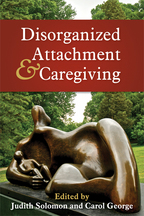Disorganized Attachment and Caregiving
Edited by Judith Solomon and Carol George
Hardcovere-bookprint + e-book
Hardcover
orderMarch 25, 2011
ISBN 9781609181284
Price: $72.00427 Pages
Size: 6" x 9"
“Theory and the practical application of research findings are firmly linked throughout the book....For researchers and counsellors generally, this is an essential read. Those working in the field of adoption and fostering will find it a valuable contribution to their work, both in developing and updating their understanding of disorganized attachment and in knowing how to apply this new knowledge in a practical way.”

—Therapy Today
“Recommended. Upper-division undergraduates through faculty and professionals.”

—Choice
“This is an exciting follow-up to the editors' influential prior volume on attachment disorganization, which was published when the concept was relatively new. Disorganized attachment has been researched broadly in the intervening years. This volume summarizes important current findings and takes a significant next step toward defining the disorganized caregiving system. It features chapters from many of the leading researchers in the field.”

—Mary Dozier, PhD, Unidel Amy E. DuPont Endowed Chair in Child Development,Department of Psychological and Brain Sciences, University of Delaware
“This compelling book demonstrates the power of the disorganized attachment construct for giving meaning to behavioral and interactional patterns that may appear random, bizarre, or inconsequential. The volume combines conceptual elegance, research rigor, and clinical sensitivity. It elucidates the complex interplay of factors that shape the intergenerational transmission of disorganized patterns of attachment and caregiving. The thoughtful use of clinical material serves to substantiate and clarify the theoretical premises. This is a major contribution that will facilitate dialogue among theorists, researchers, and clinicians.”

—Alicia F. Lieberman, PhD, Irving B. Harris Endowed Chair in Infant Mental Health and Professor, Department of Psychiatry, University of California, San Francisco
“Disorganized attachment is of greatest relevance to clinicians, as it provides the primary link connecting early history with later mental disorder. This definitive volume presents the most recent advances in this area, with careful attention to both the mechanisms and clinical implications of disorganization. It is an invaluable contribution to every researcher's and clinician's library.”

—Peter Fonagy, CBE, FMedSci, FBA, FAcSS, Head, Division of Psychology and Language Sciences, University College London, United Kingdom
—Therapy Today
“Recommended. Upper-division undergraduates through faculty and professionals.”
—Choice
“This is an exciting follow-up to the editors' influential prior volume on attachment disorganization, which was published when the concept was relatively new. Disorganized attachment has been researched broadly in the intervening years. This volume summarizes important current findings and takes a significant next step toward defining the disorganized caregiving system. It features chapters from many of the leading researchers in the field.”
—Mary Dozier, PhD, Unidel Amy E. DuPont Endowed Chair in Child Development,Department of Psychological and Brain Sciences, University of Delaware
“This compelling book demonstrates the power of the disorganized attachment construct for giving meaning to behavioral and interactional patterns that may appear random, bizarre, or inconsequential. The volume combines conceptual elegance, research rigor, and clinical sensitivity. It elucidates the complex interplay of factors that shape the intergenerational transmission of disorganized patterns of attachment and caregiving. The thoughtful use of clinical material serves to substantiate and clarify the theoretical premises. This is a major contribution that will facilitate dialogue among theorists, researchers, and clinicians.”
—Alicia F. Lieberman, PhD, Irving B. Harris Endowed Chair in Infant Mental Health and Professor, Department of Psychiatry, University of California, San Francisco
“Disorganized attachment is of greatest relevance to clinicians, as it provides the primary link connecting early history with later mental disorder. This definitive volume presents the most recent advances in this area, with careful attention to both the mechanisms and clinical implications of disorganization. It is an invaluable contribution to every researcher's and clinician's library.”
—Peter Fonagy, CBE, FMedSci, FBA, FAcSS, Head, Division of Psychology and Language Sciences, University College London, United Kingdom



